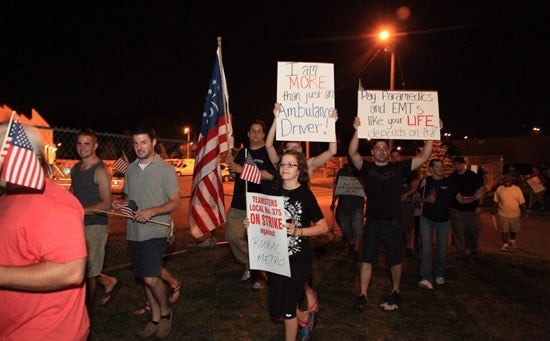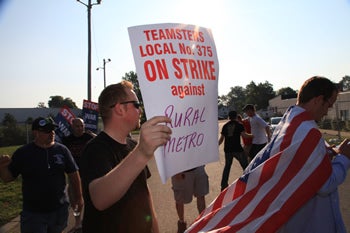Uncategorized
Victory in Rural Metro Strike
Victory for Teamster EMTs and Paramedics

They are the emergency medical technicians (EMTs) and paramedics that bring life-saving medical care to those in need in Buffalo. Whether it’s a fire, an auto accident or other tragedy, the members of Local 375 who work at Rural/Metro medical services have a duty to perform.
After private-equity firm Warburg Pincus bought Rural/Metro a few years ago, things began to change for the workers.
“We hit a brick wall when it was time to discuss improved wages and benefits with management,” said Kevin Drysdale, President of Local 375. “We had already battled through weeks of negotiating and suddenly the company began taking orders from their owner, Warburg Pincus.”
The local immediately went to work to gather public support for their fight, leafleting at the local “Taste of Buffalo” event and nearby baseball games.
“Unable to move the company far enough with this tactic, we gave the employer the required 10-day notice for a strike,” Drysdale said. “Ninety-nine percent of our unit voted to strike if we didn’t have an acceptable wage and benefit package negotiated in 10 days.”
 Finally, the local union, employer and federal mediator held an all-night negotiating session, 21-hours in all, and reached a tentative agreement. But this was not before the members were out on the street, walking picket lines and informing the area TV and radio stations that they were on strike. The action was short-lived. After seven hours of striking, the tentative agreement was reached.
Finally, the local union, employer and federal mediator held an all-night negotiating session, 21-hours in all, and reached a tentative agreement. But this was not before the members were out on the street, walking picket lines and informing the area TV and radio stations that they were on strike. The action was short-lived. After seven hours of striking, the tentative agreement was reached.
“We had power because we all were committed to standing tall. The strike was impressive,” said Dennis Wellspeak, a paramedic since 1995.
Across-the-Board Support
Support for the contract negotiations and strategy came from the Teamsters Union in the form of rally signs, fliers, corporate campaign strategy and press relations.
Within the state, the Nurses Association of New York, Erie County Executive Mark Poloncarz and state Sen. Timothy Kennedy contacted Rural/Metro to assure the company that they were standing behind the Teamster EMTs and paramedics.
“I urge you [Rural/Metro] to consider a fair offer which reflects the important work these brave and dedicated first-responders provide our community every day,” Kennedy wrote.
Because the company had offered, unbelievably, to pay a higher wage rate to temporary workers, Poloncarz stated on TV news, What if they bring someone in to do the work from Kentucky or Ohio? How would they know the city streets? This is not in the best interest of the community.”
“Warburg Pincus, the parent-company, was trying to create a Walmart-style business,” Drysdale said. “But you can’t pay bargain-basement prices for health care.”
Ultimately, the community pressure, together with the strength of the bargaining unit on the picket line, finally brought the employer to the table with an acceptable wage and benefit offer.
“In the 10 days leading up to the strike, it was clear that the leadership of Local 375 and its members were effectively implementing the contract campaign we devised,” said Michael Filler, Director of the Public Services Division. “This was a very visible demonstration of Teamster power!”
The 12-hour shifts and the intense pressure of the work attracts people who are dedicated to helping people. “When we reached the agreement with the company, I encouraged everyone to offer their services to the community right away because their professionalism was needed,” Drysdale said. Because of this, Buffalo and the surrounding area had complete coverage for emergency medical services just hours after the strike ended.
“The citizens of Buffalo are my neighbors and my friends and I am pleased that we won a fair agreement,” Wellspeak said. “The unity we have resulted in having power at the bargaining table.”